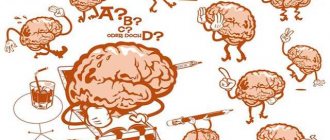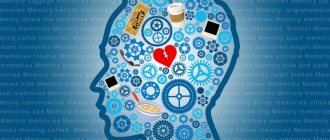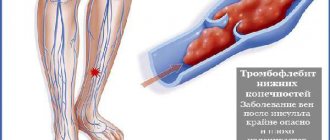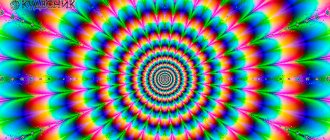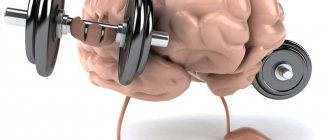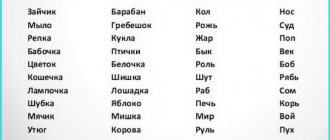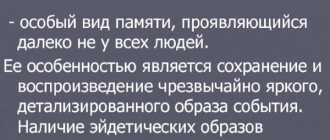It happens that our memory fails us at the most inopportune moment, and we get angry with ourselves, complaining about our bad memory. And we ask ourselves the question: “Can it be improved?” Memory can be improved. Try to memorize phone numbers, shop without lists, and memorize poems. And in general, do not spare your memory, the reserves of which are very large. And so that “senility” does not await you, do not forget to do not only morning exercises, but also exercises for the mind. There are simple exercises that are best performed while lying down, after waking up, for 7-10 minutes, saying everything out loud or at least in a whisper.
- Say the letters of the alphabet one by one, thinking of a word for each of them. If you think for more than 15 seconds, skip that letter and move on.
- Counting backwards: Count from 100 to 1 as quickly as possible.
- Name 20 female names, assigning them a serial number (for example: Alena - 1, Bonya - 2...)
- Do the same with male names.
- Now name 20 food names in order (Bread, cucumbers, cutlets, borscht...)
- Name 20 words starting with the same letter, numbering each word (1-car, 2-elephant, 3-dolphin...)
- Count to 20 in any foreign language.
A brilliant memory can be inherited (genetic memory), but it can also be developed using certain techniques.
How to improve memory, make it more tenacious and capacious? The most effective way is to repeat the material. This well-known memorization mechanism often turns out to be more effective than many other tricky tips. If some phenomena are repeated many times, then they are remembered better. The memorized material does not need to be “chewed” for a long time, until exhaustion; it is better to repeat it after a pause of two to three hours or a day later. We must try to comprehend the material, understand the main idea, the most essential. In other words, you must definitely “turn on” logic to effectively master the material. The “stacking” of facts is helped by the use of associations: for example, a fish swims, has fins; sparrow - small, gray, does not sing and the like. At the same time, associative connections can be known for a long time or unexpected, funny, illogical, in the form of a caricatured visual image or caricature. It is important that the “picture” helps you remember what you need. This method is essentially no different from the well-known “knots for memory”. Events that made a strong impression are remembered firmly and for a long time. In other words, you remember better what you had an emotional connection to, as well as what you relate to with genuine interest. Therefore, teaching mathematics, music or a foreign language “under pressure” is ineffective. Only that which surprised, touched, truly interested, has a chance to be remembered. It is known that material is remembered better if the information perceived aurally is supported by an impact on the visual analyzer - the demonstration of slides, graphs, photographs. The simultaneous effect on hearing, vision and other analyzers contributes to better recording of information. On this basis, schools encourage the use of “visuality” - stands, drawings, dummies... The effectiveness of memorization significantly depends on the focus of attention. There is no doubt that many phenomena do not leave a trace in our consciousness due to the fact that we treat them without due attention. Distractibility, lack of composure, disorganization are problems that parents and teachers often face (although sometimes they themselves are not particularly pedantic). But you need to know: in children, active attention is formed as they “grow up”; sometimes long-term efforts and special exercises are required for its development. (Vladislav BRAGINSKY, Candidate of Medical Sciences, Honored Doctor of the Russian Federation) Vitamin B6 and trionine play a major role in improving performance, increasing concentration, and developing memory. Both of these substances are contained in the drug " Biotredin"
" This drug not only improves brain activity, increasing attention and mental performance, but also has a beneficial effect on the functioning of the nervous system.
Massage... brain
Studying the reflex connections of the tongue and the oral cavity, specialists from one of the Moscow institutes came to the conclusion that prolonged (5-10 minutes) rinsing the mouth has a certain effect on the activity of the central nervous system. Studies have shown that the beginning of rinsing in most healthy and sick people is accompanied by activation of excitation processes. Then, at the moment of release of liquid saliva and especially at the end of rinsing, slow potentials intensify on the encephalogram, the alpha rhythm becomes more regular and pronounced. Such complex changes can be compared to a kind of brain massage, which has a very beneficial effect on the processes occurring in it.
Brain and memory training
Until recently, IQ level was considered heritable, with the possibility of improvement only to a very limited extent. However, recent research shows that the human brain works similarly to a computer. Intelligence largely depends on working memory, i.e. the amount of information used to create thoughts.
“Working memory can be improved with proper training,” says Torkel Klingberg from the Karolinska Institutet in Stockholm. “This can be achieved, for example, by memorizing as many objects as possible, displayed on a computer monitor or laid out on a table.” As a result of this training, the people studied showed a 10% improvement in IQ test after just a few days of training.
Memory Improvers
Eat horseradish with your dishes. 1 tbsp. per day - an excellent remedy for the brain. or horseradish with lemon - Horseradish. grate the root (0.5 mayonnaise jar) and 3 lemons with zest, add 3 tbsp. l. honey and leave in the refrigerator for 3 weeks. Take 1 tsp. 2 times a day with meals. It is also good for vision. - Walnuts. You should eat 5-7 pieces a day, crushed with fresh cream. — Finely grate 3 onions, squeeze out the juice, mix in half with honey and take 1 tbsp. l. 3 times a day half an hour before meals.
Herbs for the brain and memory
Now let's see which herbs improve memory and brain function. They can be used at home. But before using herbal treatment, it is advisable to consult a doctor.
Ginkgo biloba
Ginkgo biloba is the oldest plant on our planet. It contains a wide range of beneficial substances, including:
- flavonoids;
- terpene clactones;
- phenolic substances;
- organic acids, etc.
These substances have antioxidant effects and increase blood flow in the peripheral parts of the body such as the brain, fingers, toes, etc. Ginkgo biloba extract enhances memory, is used in the treatment of Alzheimer's disease, and during rehabilitation after a number of diseases.
Rhodiola rosea
Rhodiola is an herb that is effective in many ways; one of its species grows in our mountainous regions. This plant is a good remedy for improving blood circulation, brain function, memory support, and concentration. Due to its qualities, Rhodiola is recommended for use by forgetful people.
This herb for improving memory and brain function improves the formation of serotonin in the brain, suppresses the manifestations of depression, and eliminates sleep disorders. With its help you can be treated for neuroses.
The natural remedy helps relieve psychogenic headaches, improve hearing, and is used as a supportive treatment for Parkinson's disease.
Camellia sinensis
Already in ancient China they knew that the young leaves of this shrub support blood circulation in the brain. Consequently, they belong to folk remedies for restoring memory and improving concentration.
Ginkgo biloba stimulates the brain
The brain, no less than other organs of the body, needs nutritional support to perform its functions normally! Ginkgo biloba can improve mental function, support and protect the membranes of brain cells. According to experts, this plant is a real leader among its own kind in strengthening the blood vessels and capillaries of the brain. Ginkgo biloba prevents capillary fragility and also improves the supply of blood and oxygen to the brain, thus preventing memory impairment. In addition, ginkgo biloba contains active substances that cleanse blood vessels, protect brain cells from the effects of free radicals, and help reduce blood viscosity. Of course, you can buy various medications containing ginkgo biloba at the pharmacy. But try making a healing drink with your own hands. You can do this as follows: take 1 tbsp. l. ginkgo biloba herbs, pour into a thermos, pour 250 ml of boiling water, leave for 1-2 hours, drink 1/3 of a mug 3 times a day 30 minutes before meals. Ginkgo biloba gives a boost of energy and helps cope with depression.
If you have proven folk recipes on how to improve memory , write them in the comments below
Movement for the brain and memory
Researchers from the Feinberg School of Northwestern University of Medicine in Chicago say exercise can improve brain activity and memory. In addition to improving cardiac activity, preventing stroke, heart attack, training affects the proliferation of nerve cells, strengthens their connections, and protects them from damage. Strength exercises, high-intensity exercise, Pilates, and yoga are recommended.
Movement promotes the production of neuroprotective compounds, increasing blood flow to the brain and hence the supply of nutrients. Medical science calls the brain's ability to regenerate and recover neuroplasticity.
How to help children quickly memorize the periodic table
If you want to not only train your teenager’s memory, but also help with his studies, learn the periodic table in chains (lines from the table). In a sequence, the next and previous words are connected. The connection must be vivid, emotional and detailed for visualization and quick recall.
Imagine a pack of salt with a huge magnet sticking out of it. Suddenly he pulls towards him an aluminum spoon filled with cream. There is a fish in the cream, and wax is falling out of its ears. Suddenly the fish comes to life and jumps into the pool, but breaks into the water and its organs are scattered throughout the pool. This is not a meaningless story, but a phonetically encoded 3rd line from the periodic table. You need to choose your own images or words that sound similar to all the elements. Then tie them tightly into a chain:
- sodium - salt;
- magnesium – magnet;
- aluminum – aluminum spoon;
- silicon - cream;
- phosphorus – fish;
- wax – earwax;
- chlorine - swimming pool;
- argon - organs.
Why does memory deteriorate?
Before you start using certain herbs to improve memory, you should identify the true causes of decreased brain activity. This will help you choose the right herbal medicine products for you. In addition, for their use to be effective, it is important to adjust a number of your habits and minimize factors that negatively affect brain function.
The main cause of forgetfulness is considered to be age-related changes that disrupt the functions of brain cells - neurons. However, we often meet older people whose memory and acuity of thinking could be envied by thirty-year-olds. It turns out that brain aging occurs at different rates in different people. So, let’s name the factors that accelerate the process of age-related decline in cognitive abilities.
Bad habits
Smoking causes blood vessels to narrow and spasm, causing brain cells to lack oxygen and die. As a result, attention and memory weaken, and mental operations require more time. coffee increases mental performance immediately after consumption, its abuse weakens and depletes the nervous and cardiovascular systems. Alcohol also attacks blood vessels, making them fragile and causing hemorrhages. In addition, it destroys neural connections, causes metabolic failure and a deficiency of vitamins needed by the brain, in particular group B, which leads to the death of neurons. And no matter what useful herbs you use to improve memory, nicotine, coffee and alcohol can reduce all their healing effects to zero.
Poor nutrition
Fast food, chips and confectionery products contain trans fats, which are real poison for blood vessels, causing hypertension, atherosclerosis, and ischemia. High intake of trans fatty acids is associated with Alzheimer's disease. An excess of fast carbohydrates in the diet also harms blood vessels. It is worth giving preference to minimally industrially processed products, vegetables and fruits grown on farms or household plots. After all, food additives, pesticides and herbicides undermine the human body in general and the brain in particular.
Deficiency of nutrients needed by the brain in the diet
Particularly critical for the health of the nervous system and brain is a lack of dietary vitamins E, C, D, group B, beta-carotene and flavonoids, omega-3 unsaturated fatty acids, calcium and iodine, zinc and selenium. Obtaining them from natural sources is preferable to synthetic multivitamin complexes.
Physical inactivity
Insufficient physical activity is the most important factor in the development of hypertension, atherosclerosis, and ischemia, which in turn impair brain activity.
Oxygen starvation
Hypoxia of brain cells can be caused by external conditions (stay at high altitude or depth), respiratory failure, cardiovascular and other diseases. Whatever its causes, it damages neurons, and in the case of severe oxygen deficiency, this damage can become irreversible or lead to death.
Lack of constant intellectual stress
Like any other organ, the brain functions properly only when it experiences constant stress. Without them, he simply begins to become lazy and atrophy. Therefore, memory, attention, thinking can and should be trained. Know that herbs for improving memory will not help if you do not engage in mental work at all, do not read, do not solve logic problems, do not play chess or do crossword puzzles.
Excessive mental stress
Everything is good in moderation. Constant work without breaks for proper rest and change of activity does not allow brain structures to recover. Therefore, workaholics are at risk of chronic overwork, which develops into exhaustion. Experts recommend diluting an 8-hour work day with at least four 15-minute breaks for relaxation, relaxation, and physical exercises. In addition, you should take a break from work every 30–45 minutes. This will only increase your productivity.
Stress
Moderate stress mobilizes us to perform complex work, activating memory, attention and thought processes. However, severe and/or chronic mental stress, increased anxiety and negative emotions negatively affect both the functioning and the size and structure of the brain. Long-term overproduction of cortisol due to constant stress contributes to the destruction of connections between neurons in the hippocampus and the death of the nerve cells themselves. As a result, memory suffers and the risk of developing Alzheimer's disease increases.
Sleep disturbance
Even a one-time lack of sleep makes a person distracted, irritable and anxious. And with chronic insomnia, the likelihood of developing mental disorders and Alzheimer's disease increases. It is noteworthy that it is during sleep that the brain recodes the information received during the day into images and symbols to transfer it into long-term memory. Hardware studies have shown that in people with sleep disorders, the activity of the brain areas responsible for working (short-term) memory is significantly reduced.
Diseases
The range of health disorders that impair memory and brain activity in general is wide. It includes hypertension, atherosclerosis, stroke, head injuries, multiple sclerosis, dementia, depression, neurosis, diabetes, brain tumors, encephalitis and meningitis, thyroid diseases, etc.
Reasons for the deterioration of the ability to remember in adulthood
There are natural reasons that inhibit mental activity. As well as external factors affecting concentration and the ability to remember.
The first include:
- Slowing down metabolic processes in the body;
- Vascular dysfunction.
- Injuries or infections of the head that lead to dysfunction of some of its parts;
- Lack of physical activity;
- Unbalanced diet;
- Stroke or heart attack;
- Lack of interest in new knowledge and hobbies;
- Stress and depression.
This causes neurons to lack oxygen and nutrients. Concentration and memory ability gradually decrease.
External factors include:
Short-term memories disappear first. That is, the information received last is forgotten.
How to stop forgetting
Let's talk about effective ways to remember what you forgot. It often happens that we forget seemingly strange things (what we wanted to take from the refrigerator, where we put our glasses, or what the name of the interlocutor is). This usually happens due to a lack of awareness and concentration when making a decision.
For those who periodically find themselves in a room, but do not remember why exactly, we explain: there is a theory that various doors and arches serve as “dividers”. The point is that when we cross a doorway or archway, consciousness switches. “That’s the reason we don’t remember why we came.”
The easiest way out is to go back along the same route physically or at least mentally (remember yourself in the previous room, recreate the sensations in detail without using your imagination). Model the situation in a calm atmosphere, without distractions.

